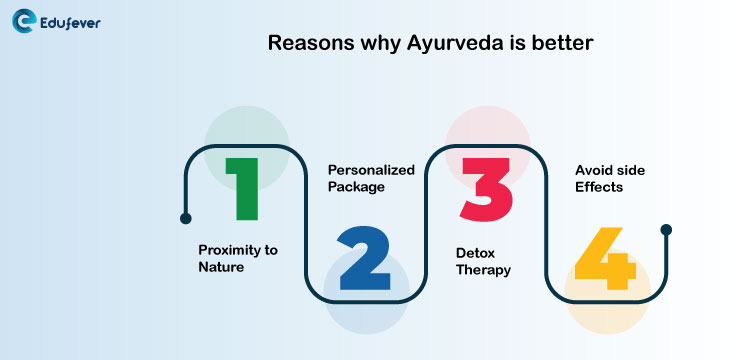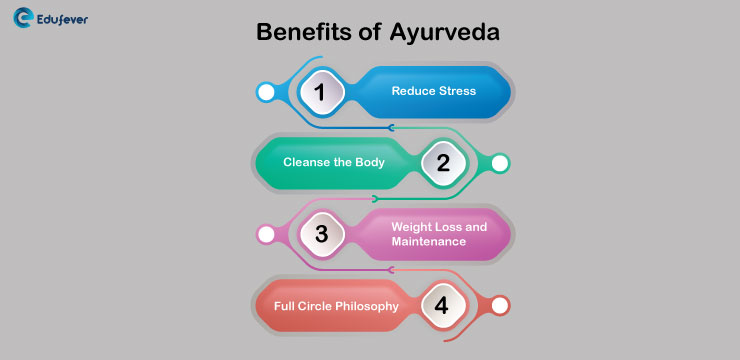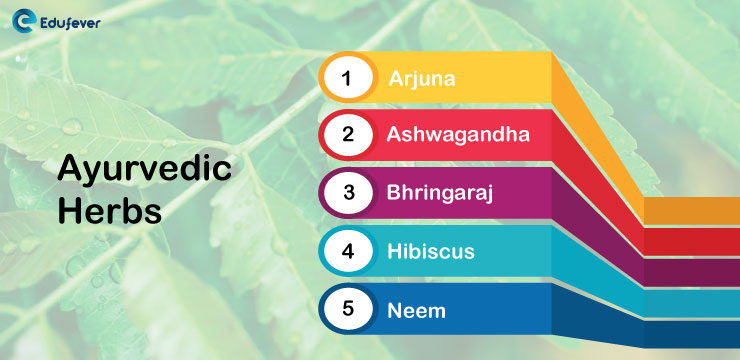Ayurveda combines the words Ayu and Veda, meaning the knowledge of life. It is a comprehensive natural holistic healthcare, which is 5000 years old and is commonly adopted in India, especially rural India, where 70% of the population lives. It includes all aspects of life and the environment through mind consciousness. It works by tridosha (Vata, Pitta, Kapha), which has been validated with 90% certainty in a biostatistical study. By understanding the origin of the disease, ayurveda targets eating, breathing, digestion, thoughts, memory and sleep, which are easy approaches helpful to gain good health.
| NEET UG Counselling Guide 2025 | |
|---|---|
| State-wise MBBS/BDS Counselling Guide eBook 2025 | 📥 Download |
| MCC NEET UG Counselling Guide eBook 2025 | 📥 Download |
| AACCC AYUSH NEET Counselling Guide eBook 2025 | 📥 Download |
It works at the mind level and is, therefore, able to motivate the patient at a mental level, which is very important for improving treatment outcomes in drug dependence and lifestyle disorders like diabetes mellitus, hypertension, insomnia and acid peptic diseases. Through this article, readers will gain a thorough knowledge of Ayurveda.
[Page Index]
Quick Facts
Below is a summary of Ayurveda.
| Particulars | Description |
|---|---|
| Types of Doshas | Vata, Pitta, Kapha |
| Founder of Ayurveda | Dhanvantari |
| Father of Ayurvedic Medicine | Acharya Charak |
| Ayurvedic Herbs | Arjuna, Ashwagandha, Bhringaraj, Hibiscus, Neem |
| Ayurveda Course | Bachelor of Ayurvedic Medicine and Surgery (BAMS) B. Pharm (Ayurveda) BSc Nursing (Ayurveda) MS/MD in Ayurveda PhD in Ayurveda |
| Ayurveda Course Eligibility | UG: 10+2 with 50% marks PG: BAMS degree |
What is Ayurveda?
Ayurveda is an alternative medicine system with historical roots in the Indian subcontinent. The theory and practice of Ayurveda are pseudoscientific. It’s based on the belief that health and wellness depend on a delicate balance between the mind, body and spirit. Its main goal is to promote good health, not fight disease. However, treatments may be geared toward specific health problems.
Ayurvedic doctors will use herbal medicines and dietary practices, touch, colour, aromatherapy, and sound therapy to heal your patients. There are medical subspecialty areas in which Ayurveda is actively used, such as internal medicine, surgery, psychiatry, ENT, gynaecology etc.

Who is the founder of Ayurveda?
Ayurveda is attributed to Dhanvantari, the physician to the gods in Hindu mythology, who received it from Brahma. Its earliest concepts were set out in the portion of the Vedas known as Atharvaveda. Ayurveda is one of the few systems of medicine developed in ancient times that is still widely practised in modern times. As such, it is open to the criticism that its conceptual basis is obsolete and that its contemporary practitioners have not taken account of the developments in medicine.
Responses to this situation led to an impassioned debate in India during the early decades of the twentieth century between proponents of unchanging tradition (śuddha “pure” Ayurveda) and those who thought Ayurveda should modernize and syncretize (aśuddha “impure, tainted” Ayurveda). The political debate about the place of Ayurveda in contemporary India has continued to the present, both in the public arena and in government. The debate about the place of Ayurvedic medicine in the contemporary internationalized world continues today.
How does Ayurveda work?
The mind-body type characterizes every human. In Ayurveda, these primary qualities that govern the body are called “doshas.” There are three doshas, each of which has specific functions based on the elemental forces they are made of. Vata governs movement, Pitta governs digestion, and Kapha governs structure. Each of the Doshas performs specific functions related to the body.

When these doshas are perfectly balanced, the state of being is healthy. When they fall out of balance through dehydration, anxiety, stress, low energy or excessive exertion, the person is propelled into a state of “vikruti” – an imbalanced state of body and mind.
Ayurveda obtains health and keeps the doshas in balance. Overall, it aims to maintain and improve general health regardless of age holistically.
Reasons why Ayurveda is better

- Brings proximity to nature: As the ingredients used to make the necessary ayurvedic medicines are natural, a patient gets closer to nature and witnesses the amazing detoxification therapy nature offers. Moreover, nature is known to contribute not only to the physical wellness of a person but also, the emotional and mental wellness. Hence, ayurveda promotes positive holistic living.
- A personalized package: As every patient suffers from a different problem and to a different degree, ayurveda designs the therapies according to the patient’s needs. Wellness centres focus on many aspects, such as diet, medication, nutrition etc. Hence, the fact that not the same ayurvedic treatment can be given to all, but it is customized encourages people to prefer it.
- A holistic detoxification therapy: As mentioned earlier, ayurveda serves to the mind, body and soul. Hence, when we say holistic detoxification, it means that along with the benefits to the body, the mind and the soul is calmed too. It pampers the body with amazing natural oils that enhance the blood circulation in the body and relax the soul of a person.
- Avoid side effects: Because naturopathy uses all-natural products, unlike allopathy, there are rare chances of suffering from allergies or side effects. The process of healing takes place gradually and effectively.
Benefits of Ayurveda

1. Reduce Stress
With a fast-paced lifestyle that leaves no scope for rejuvenation or peace, Ayurveda guarantees a decrease in stress and anxiety. Regular routine of yoga, meditation, breathing exercises, massages, and herbal treatments allow the body to calm down, detoxify, and rejuvenate. Yoga improves the autonomic nervous system making your mind alert, so you can focus well and stay energized throughout the day. Breathing exercises keep infections at bay and allow abundant oxygen supply to the cells to create awareness. Depression and anxiety can be treated with Shirodhara, Abhyangam, Shiroabhyangam, and Padabhyangam.
2. Cleanse the Body
Panchakarma in Ayurveda is the practice of eliminating bodily toxins through enemas, oil massages, bloodletting, purgation, and other oral administration. Administering these components in the human body allows for the elimination of food and toxins that interfere with efficient bodily functions. A cleansed body, in turn, aids in improved overall health. Suitable home remedies that are vastly used in Ayurvedic herbal medicines are cumin, cardamom, fennel, and ginger which cure indigestion in the body and prevent bloating.
3. Weight Loss and Maintenance
A healthy diet and modification in lifestyle habits through Ayurvedic treatments help shed excess body fat. In Ayurveda, weight is not a major concern, but eating habits are. It can achieve a toned body by allowing the body to detox through correct dietary restrictions.
4. It Provides a Full Circle Philosophy
Ayurveda reminds you that you’re much deeper than your skin. There is an essence to you and an energy that can light up the world. Ayurveda will continue to remind you that you are more than just muscle and bones, but also a spirit which embodies the elements. While the health benefits will positively impact your physical self, they also bring together your mind, body, and soul and keep balance. You will begin to see and feel that healing begins from within, starting with the food you put in your body.
Importance of Ayurveda in Modern Life
- Ayurveda is a lifestyle choice, and when adopted entirely, it brings a wave of general well-being to your daily life.
- Ayurveda works perfectly with alternative medicine, which is practical for everyday use.
- Ayurveda helps reclaim health with balanced dietary guidelines, effective sleep patterns, home remedies, daily and seasonal routines, yoga, and exercise patterns.
- Heightens concentration levels through yoga, meditation, herbal intake, and adequate sleep helps amend mental and goal-based settings in your daily life.
- Ayurvedic treatments improve digestion and increase appetite and immunity.
- The basic principles of Ayurveda constitute the following disciplines – don’t skip breakfast, eat a light dinner, avoid sleeping and waking up late, drink water, eat organic produce, avoid smoking and drinking, and maintain an active lifestyle.
Ayurveda vs Allopathy
There is a difference between Ayurveda and allopathy medicines. Ayurveda heals diseases from the root but does not provide instant relief, whereas allopathy offers instant relief but has side effects. Below we have mentioned some of the differences between the two.
| Basis | Ayurveda | Allopathy |
|---|---|---|
| Form | Ayurveda is an ancient form of alternative medicine course which involves the treatment of diseases with the help of herbs, vegetables and minerals, followed by wholesome betterment of the human body. | Allopathy involves curing ailments with clinically tested drugs for better results. |
| Acceptance | Ayurveda does not accept or include Allopathic treatments. | Allopathy can easily accept Ayurvedic forms of medicine if they pass all required clinical trials performed by professionals. |
| Side Effects | Ayurvedic medicine has no side effects. | Allopathic medication does have side effects. |
| Effectiveness in an Emergency | Ayurvedic medicine, though natural, takes a bit longer to prove its worth and can rarely be used in emergencies. | Allopathic medication is highly effective in an emergency as it gives faster results. |
Importance of Ayurvedic Courses
Indian culture is known for Ayurveda and Yoga. Along with the rise of modern treatments, the use of modern-age medicine is increasing, which is great in its effectiveness but comes with various side effects. The human body is best suited to organic foods and made for digesting and absorbing them, not to these harsh medicines, which can harm the human body in the long term.
There are many ayurvedic courses for making a career in Ayurveda, but BAMS, BUMS, BHMS and BSMS are the best in India. Interested candidates can pursue courses in Ayurveda. The job opportunities after BAMS are fairly high.
What are Ayurvedic Herbs?
Herbs are at the very heart of the Ayurvedic tradition. Ayurveda recognized the power and potency of botanicals grown from the earth. Many of the herbs we carry have been used for centuries to promote mental clarity, radiant skin, lustrous hair, manageable weight, healthy function of the liver, and a robust immune system, among other benefits.
The following are the Ayurvedic Herbs:
1. Arjuna
Arjuna (Terminalia arjuna) is one of Ayurveda’s quintessential herbs for the heart. Along with strengthening and toning the physical muscle of the heart, this rose-coloured tree bark is also known to nourish and uplift the energetic and emotional aspects of the heart, bolstering an inner sense of courage, resiliency, and love.
2. Ashwagandha
Ashwagandha (Withania somnifera) has been used in Ayurveda for thousands of years as a Rasayana (rejuvenating). It is a renowned adaptogenic herb, which means it is used to help the body resist physiological and psychological stress by adapting to the needs of the body. Deeply supportive of many tissues and body systems, including the immune system, the reproductive system, a healthy thyroid, and much more, ashwagandha is a wonderful herb to help nourish overall health and well-being.
3. Bhringaraj
Bhringaraj (Eclipta prostrata) is renowned as one of the most supportive herbs for hair growth, shine, and lustre in Ayurvedic pharmacopoeia. Although this herb gets a lot of attention for its powerful effect on the hair, its gifts extend far beyond a head of luscious locks. It brings its cooling, rejuvenating benefits to the mind and nervous system while it also supports the liver, circulation, and even healthy skin.
4. Hibiscus
The hibiscus plant (Hibiscus sabdariffa) may be best known for its bright, beautiful blossoms, which naturally transport the imagination to a warm, tropical paradise. These bold, delicate flowers have commonly been enjoyed for their decorative beauty and used in sacred devotional ceremonies, but their generous offerings don’t end there. The hibiscus flower also carries a soothing, purifying, and healing energy that makes it a precious and powerful herbal ally.
5. Neem
Neem is notorious for its strong, unpleasant taste. Its flowers have a delicious honey-like scent that can be smelled for miles. As a fast-growing tree that needs little water, neem is also a renewable resource. In some parts of the world, the neem tree is called the “Village Dispensary” because each part of the plant possesses at least one health-promoting property.
For years, various parts of the neem tree have been gathered for traditional health-promoting, and practical everyday uses. The leaves, fruits, bark, and seed oil offer a wealth of benefits to the skin, nails, scalp, teeth, and gums.




